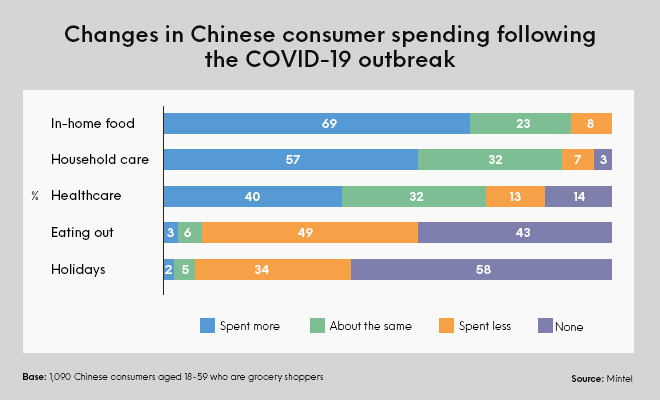
In order to consistently monitor consumer sentiment during the COVID-19 outbreak, Mintel is conducting proprietary research among consumers aged 18-59 across urban China.
Today, we’re excited to share the new key findings from data collected February 28-March 6, during which time most cities in China were still enforcing quarantine measures or encouraging people to stay indoors.
CHANGE IN FINANCIAL CIRCUMSTANCES
Our biggest learning from the data is a drop in financial security during the outbreak. Half of consumers say their finances are worse off than before the outbreak. And, understandably, this is most obvious among younger generations (under 30s), low earners, private sector workers, and those self-employed.
As businesses cut back on investment, this will soon impact job security and income growth prospects, which are the driving factors of consumer spending confidence, according to Mintel research on consumer spending priorities in China. Noteworthily, in 2018, private enterprises and self-employed individuals accounted for 56% of China’s urban workforce, according to the NBS. It is this sector that will be the most vulnerable to the negative effects of the outbreak.
ESSENTIAL CATEGORIES SHOW RESILIENCE
Looking at immediate changes in spending compared to before the outbreak, essentials such as food, as well as categories that relate to better hygiene and wellbeing are enjoying the highest mention of increased spending; whereas spending in discretionary categories is all being reduced.
In-home food and household care are experiencing the highest mention of increased spending, which suggests new product launch opportunities. For example, as many as four in five consumers are cooking at home every day, with a third of 18-29 year olds saying that they enjoy it; this indicates ample opportunities for brands to target younger households who are likely to own trendy, small kitchen appliances in the pursuit of a high-quality life, according to Mintel research on small home appliances.
Instead of stocking up on long-shelf-life canned foods or prepared meals as a short term reaction, our research indicates a longer-term growth opportunity for high-quality home cooking products from fresh groceries, gourmet sauces, and seasonings or even creative recipes as people now find joy and pride in cooking from scratch, which also helps them eat more healthily.

DISCRETIONARY: SLOWLY RECOVER OR BOUNCE BACK QUICKLY?
At this stage, it is too early to conclude how much of an impact changes in financial confidence will feed into consumer spending in these sectors in the near future. There will still be demand for an indulgence or treat on occasion, as people will need that feel-good factor to lift their mood during this challenging time (as discussed in a previous post on this topic). But as income is closely related to spending willingness in China, Mintel expects that rational spending, rather than relentless spending after the outbreak, is likely to be the norm.
CONCERNED BUT NOT PANICKING
Although healthcare has jumped from one of the bottom three (before the outbreak) to one of the top three sectors (after the outbreak) by mention of increased spending, the majority of consumers say they have not spent more on healthcare (including health supplements and over-the-counter (OTC) and pharmaceutical products) even during the outbreak.
This suggests that people are not in panic mode any more. As the outbreak starts to get under control in China and people get more information about how to stay safe, the initial period of nervousness and confusion will calm down. This, again, suggests it is more important for companies and brands to focus on longer-term impacts over short-term reactions.
WHAT DOES IT MEAN FOR BUSINESSES?
In a recent blog post on COVID-19, we said that “it’s important not to go overboard considering the short-term negatives.” Our view remains the same today.
Some sectors will suffer more heavily and take longer time to recover, especially the out-of-home discretionary spendings categories. However, there has been a lot of speculation that reactionary consumption (buying things for the sake of it) will increase rapidly once the outbreak comes to an end because people will have missed the thrill of buying. But Mintel research does not support this theory – at least not given current markets and consumer sentiment.
A bigger probability is that people, especially those who have lost job security, will go back to spending within their means and even becoming more prudent with a saving mindset. Making more money and spending it rationally is likely to be the main theme for Chinese consumers for the remainder of 2020. Instead of betting on hypothetical, retaliatory consumption, smart businesses should pay attention to risk management and be prepared to market a sense of protection, reliability, and value in their offerings.
By Ruyi Xu
